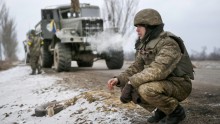A year ago, Ukrainian troops retreated from Debaltseve; official spokesmen of the military and political command called the retreat a “success,” but many are still skeptical about it. Before Debaltseve, Ukraine suffered a series of defeats, including the Battle of Ilovaisk that raised questions about the causes of the tragedy. The real culprits behind shortcomings that led to hundreds and thousands of deaths and territorial losses have not been named yet. Since the retreat from a strategic railway junction was claimed to be a “success,” no public investigation into the causes of the tragedy has been possible, although The Day understands that some kind of investigation is underway.
Even as the fighting raged, another tragedy, known as the Minsk II talks, played out at the highest international political level. The talks saw Petro Poroshenko occasionally leaving the room for phone conversations during negotiations with Vladimir Putin in the presence of Angela Merkel and Francois Hollande. It is possible that the president got online messages, particularly regarding the situation in Debaltseve. When the agreements were being signed, Debaltseve was still controlled by Ukrainian troops, but the strange surrender of Lohvinovo (the town was key in this story, being located on the supply line, but for some reason, it was left undefended) already hinted that the crisis would soon be resolved, and not in our favor. And so it happened. The Minsk II agreements were called “peace agreements,” but their implementation was delayed for a few days. The enemy took Debaltseve precisely over these few days.
Despite the General Staff’s claims of a planned retreat, eyewitnesses tell stories of Ukrainian soldiers being hidden by residents of Bakhmut (Artemivsk) in their apartments, and three-wheeled damaged military vehicles entering that city. Also, it is unclear why the retreat and all that talk about blown-up railroad tracks was even needed, when defense was still possible, and it should have been organized. Incidentally, the enemy quickly repaired the abovementioned tracks, restoring the connection not only between Luhansk and Donetsk, but above all with Russia. The several days-long breakdown of communication, lack of mandatory passwords in the sector and many other things showed that no coordinated retreat happened. There was a clear feeling of chaos, which calls into question competence of command. Let us stress it – we mean competence of the high command.








